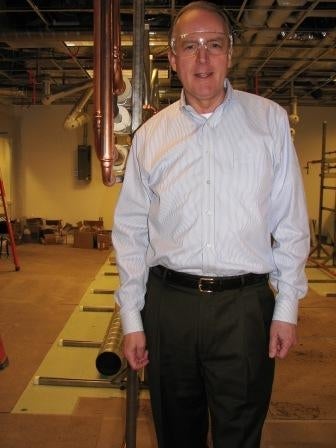Qteros Inc.’s scientists and employees are busy working from their new Marlborough headquarters on turning a microbe discovered in the wetlands near the Quabbin Reservoir into the next big thing in ethanol production.
The company, formerly SunEthanol Inc., got its start in Hadley, with scientist Dr. Susan Leschine, a University of Massachusetts Amherst professor. She found the unique bacteria, which the company has named the “Q” microbe. That microbe turns plant waste into ethanol (which can be used as fuel) without adding many enzymes and does it in one stage rather than two, making it more efficient than most cellulose-to-ethanol processes.
“We have a lot of confidence in the future,” said William Frey, CEO of Qteros, who joined the company in June 2008.
Off The Ground
In fact Frey was so confident that he helped convince venture capital investors to invest $25 million in the startup last year.
Frey’s background includes leading a biofuels team at chemical giant Dupont. He said his many years in the industry gives him and the company a broad perspective about ethanol and business in general. “After being at a large corporation, I know what it takes to compete,” he said.
One thing that makes Qteros competitive is that the Q microbe works more efficiently than other ways of breaking down cellulose, or waste plant matter, into ethanol. One of the big costs for the ethanol producing industry are enzymes to break down the cellulose, or plant matter, but “Q” makes most enzymes unnecessary, Frey said.
The company’s process can also use just about any type of plant waste, and even paper pulp, to make ethanol.
“It’s not just about using existing crops,” Frey said, because the company does not want to use crops that are used for food, such as corn. Although, the process could use corn stalks, he said.
“The potential for using wood is great. We know so much about it: how to harvest it, move it and process it,” Frey said.
But it certainly isn’t the only source of energy. Switch grass, which can be grown in poor soil, woody biomass and sugar cane pulp, which is left over in the sugar-making process, could all be used in Qteros’ process, he said.
Qteros has plans to license its technology to producers rather than get involved in full-scale manufacturing itself, Frey said.
The company’s small pilot plant in its Marlborough facility should be up and running this summer, with a larger pilot plant being built in Springfield’s Indian Orchard area.
While it works on making the Q microbe more efficient and putting together its pilot plants, the company is also looking at the long-term future.
And it’s a future that may include more than just biofuels.
“Ethanol is our initial focus but we think that beyond alternative fuels, there is a market for sustainable chemicals. We don’t feel we’re limited to fuels,” Frey said.
Sign up for MetroWest495 Biz today!

